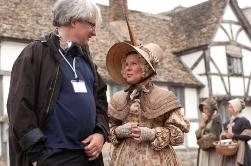My Job Directing Cranford | reviews, news & interviews
My Job Directing Cranford
My Job Directing Cranford
Director Simon Curtis reveals how Cranford was revisited, in all its bonneted splendour
When Cranford was first shown in 2007 on a Sunday night and then repeated the following weekend, those first two showings got over 10 million people watching each week. You obviously pay attention to that. And because the first series wasn’t a straight adaptation of a finished book but based on a set of short stories by Elizabeth Gaskell, there was always the potential for more.
When people first came to Cranford they found it surprising in a very obvious way. Unlike a Jane Austen adaptation, when you know how it’s going to end, or David Copperfield which I have directed for the BBC, the audience didn’t know how the narrative would turn out. And even if people had read Cranford, they wouldn’t have known which stories we had taken, or what the shape would be. So it was surprising, and in the current climate audiences gravitate to the fresh and the new. But it was also surprising in terms of tone. It was genuinely funny, which not many classical adaptations are.
The other thing is that the details of the community spoke to the audience. A lot of people long to live in a tight, intimate community where your existence is noticed, where there is a set of rules and rituals to live by. Anchored in the small town, it is comparable to Desperate Housewives or Coronation Street, a virtual world that people disappear into.
 Mrs Gaskell looks at this community in Cheshire that is for one reason or another dominated by a group of women. So it’s a woman’s perspective on a group of women at a particular time in English history. I’ve heard people talking about Desperate Victorian Housewives. In the new series there’s a foursome – the characters played by Judi Dench, Julia McKenzie, Imelda Staunton (pictured with the director) and Deborah Findlay - and someone has said it almost feels like Sex and the City.
Mrs Gaskell looks at this community in Cheshire that is for one reason or another dominated by a group of women. So it’s a woman’s perspective on a group of women at a particular time in English history. I’ve heard people talking about Desperate Victorian Housewives. In the new series there’s a foursome – the characters played by Judi Dench, Julia McKenzie, Imelda Staunton (pictured with the director) and Deborah Findlay - and someone has said it almost feels like Sex and the City.
My first job ever was assistant director on Caryl Churchill’s play Top Girls at the Royal Court, which had an exclusively female cast. I’ve always worked with a lot of women. When I did David Copperfield, Maggie Smith and Imelda Staunton were in it and last year I directed Julie Walters in A Short Stay in Switzerland. In fact most things I have done have featured strong actresses including Anne Bancroft, Sharon Stone, Sally Hawkins, Miranda Richardson and, my favourite, my wife Elizabeth McGovern. It does help on Cranford that the blend of the cast includes some of the great formidable actresses.
As a director you have a different relationship with every actor you work with. It’s your job to find out how you can make yourself helpful that person. Every actor travels to a character. But actors of that calibre are successful for a reason. They bring a combination of their own personality and their ability to adapt that personality to a character.
Obviously Cranford is dominated by the women, but if the men in your cast include such people as Michael Gambon and Phil Glenister last time and now Jonathan Pryce or Tim Curry you don't exactly feel a shortage of men. Jonathan Pryce (oictured) plays a widower who is a long-term resident in Cranford but who wasn’t around in the last series because his wife had been ill and they’d been hoping to nurse her to health. But at the beginning of this series he returns a widower to Cranford. Tim Curry plays an exotic magician who is touring England and comes to play the town of Cranford.
 It’s often said that if he were alive today Dickens would be write soap opera. I don’t agree. I hope he’d be writing something bold or innovative like Criminal Justice or The Wire. But I don't think of Cranford as a soap opera either. One of the things that is fascinating about it is the element of social history. When a cat is sick in one scene, I remember thinking, here we are recreating this bizarre little episode that actually happened 150 years ago. Or dressing the cow in pyjamas: that is something that also happened.
It’s often said that if he were alive today Dickens would be write soap opera. I don’t agree. I hope he’d be writing something bold or innovative like Criminal Justice or The Wire. But I don't think of Cranford as a soap opera either. One of the things that is fascinating about it is the element of social history. When a cat is sick in one scene, I remember thinking, here we are recreating this bizarre little episode that actually happened 150 years ago. Or dressing the cow in pyjamas: that is something that also happened.
Cranford has so many people’s signatures on it. The producer Sue Birtwistle, the writer Heidi Thomas and of course Elizabeth Gaskell. In some ways I feel my job is to be a bit self-effacing on it. But I like to think I bring a wit and warmth and a humanity to the table. Television directors are woefully undervalued in this country and that’s for a whole series of reasons. It probably comes from the episodic nature of television which is by definition run by a producer and the writer, while different directors come in and visit. But directing two complex 90-minutes films in two months takes some doing. I’m very proud we managed it.
Add comment
more TV
 Blue Lights Series 2, BBC One review - still our best cop show despite a slacker structure
The engaging Belfast cops are less tightly focused this time around
Blue Lights Series 2, BBC One review - still our best cop show despite a slacker structure
The engaging Belfast cops are less tightly focused this time around
 Baby Reindeer, Netflix review - a misery memoir disturbingly presented
Richard Gadd's double traumas are a difficult watch but ultimately inspiring
Baby Reindeer, Netflix review - a misery memoir disturbingly presented
Richard Gadd's double traumas are a difficult watch but ultimately inspiring
 Anthracite, Netflix review - murderous mysteries in the French Alps
Who can unravel the ghastly secrets of the town of Lévionna?
Anthracite, Netflix review - murderous mysteries in the French Alps
Who can unravel the ghastly secrets of the town of Lévionna?
 Ripley, Netflix review - Highsmith's horribly fascinating sociopath adrift in a sea of noir
Its black and white cinematography is striking, but eventually wearying
Ripley, Netflix review - Highsmith's horribly fascinating sociopath adrift in a sea of noir
Its black and white cinematography is striking, but eventually wearying
 Scoop, Netflix review - revisiting a Right Royal nightmare
Gripping dramatisation of Newsnight's fateful Prince Andrew interview
Scoop, Netflix review - revisiting a Right Royal nightmare
Gripping dramatisation of Newsnight's fateful Prince Andrew interview
 RuPaul’s Drag Race UK vs the World Season 2, BBC Three review - fun, friendship and big talents
Worthy and lovable winners (no spoilers) as the best stay the course
RuPaul’s Drag Race UK vs the World Season 2, BBC Three review - fun, friendship and big talents
Worthy and lovable winners (no spoilers) as the best stay the course
 This Town, BBC One review - lurid melodrama in Eighties Brummieland
Steven Knight revisits his Midlands roots, with implausible consequences
This Town, BBC One review - lurid melodrama in Eighties Brummieland
Steven Knight revisits his Midlands roots, with implausible consequences
 Passenger, ITV review - who are they trying to kid?
Andrew Buchan's screenwriting debut leads us nowhere
Passenger, ITV review - who are they trying to kid?
Andrew Buchan's screenwriting debut leads us nowhere
 3 Body Problem, Netflix review - life, the universe and everything (and a bit more)
Mind-blowing adaptation of Liu Cixin's novel from the makers of 'Game of Thrones'
3 Body Problem, Netflix review - life, the universe and everything (and a bit more)
Mind-blowing adaptation of Liu Cixin's novel from the makers of 'Game of Thrones'
 Manhunt, Apple TV+ review - all the President's men
Tobias Menzies and Anthony Boyle go head to head in historical crime drama
Manhunt, Apple TV+ review - all the President's men
Tobias Menzies and Anthony Boyle go head to head in historical crime drama
 The Gentlemen, Netflix review - Guy Ritchie's further adventures in Geezerworld
Riotous assembly of toffs, gangsters, travellers, rogues and misfits
The Gentlemen, Netflix review - Guy Ritchie's further adventures in Geezerworld
Riotous assembly of toffs, gangsters, travellers, rogues and misfits
 Oscars 2024: politics aplenty but few surprises as 'Oppenheimer' dominates
Christopher Nolan biopic wins big in a ceremony defined by a pink-clad Ryan Gosling and Donald Trump seeing red
Oscars 2024: politics aplenty but few surprises as 'Oppenheimer' dominates
Christopher Nolan biopic wins big in a ceremony defined by a pink-clad Ryan Gosling and Donald Trump seeing red

Comments
...